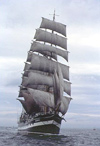The Tall Ships | Kruzenshtern, Juan Sebastian de Elcano, and Kaiwo Maru II
Updated February 21, 2017 | Factmonster Staff 

Kruzenshtern, Juan Sebastian de Elcano, and Kaiwo Maru II
For sheer size, few ships can match the Russian Kruzenshtern. A four-masted barque built in 1926, the Kruzenshtern was originally christened the Padua and carried cargo around the world for 20 years. In 1946 she was turned over to the Soviet Union, rechristened Kruzenshtern and commissioned as a training ship. Today cadets age 18 to 60 from around the world make up the crew of 160.
One of the largest tall ships to visit Boston, the Kruzenshtern is 376 feet long, with three upper decks, connected by catwalks. The mainmast stands a dizzying 174 feet above the deck. She has a steel hull. With her black topsides, and wide white stripe, the Kruzenshtern is a majestic ship. A Russian explorer born in what is now Estonia, Admiral Adam Johann von Kruzenshtern circumnavigated the globe from 1803 to 1806, and explored the North Pacific Ocean.
A training vessel for the Spanish navy, the Juan Sebastian de Elcano is as splendid as her name is historic. De Elcano was captain of the Victoria, the first ship to circumnavigate the globe. One of five ships under the command of Ferdinand Magellan, who died during the voyage, the Victoria arrived back in Spain on September 6, 1522, proving that the world was round and that the Americas were a continent separate from Asia.
The De Elcano has circled the globe several times on training missions. With her all-white iron hull the De Elcano is a picturesque vessel. Her four masts have tips made of Oregon pine and lower sections of iron. A four-masted topsail schooner, the De Elcano has a crew of 180.
Japanese for "king of the sea," Kaiwo Maru II was built in 1989 as a training ship to replace the original Kaiwo Maru, built in 1931. The 361-foot four-masted barque has two 1,500–horsepower diesel engines and ultra-modern electronics. The sleek steel vessel can set 30,000 square feet of sail, from a total of 36 square and fore-and-aft sails, at top racing speed.

